FACTBOOK 2022 Aurora University



AT AURORA UNIVERSITY, WE COMBINE THE WIDE RANGE OF programs expected at a larger university with the personal attention of a small college. Our award-winning faculty members are accessible, our partnerships with the community provide hands-on learning opportunities and internships, and our academic and support programs are designed to help students succeed. At Aurora University, students discover what matters and build their lives around it.
Aurora University is an inclusive community dedicated to the transformative power of learning. As a teaching-centered institution, we encourage undergraduate and graduate students to discover what it takes to build meaningful and examined lives. Our singular goal is to empower our students to achieve lasting personal and professional success.
Aurora University draws upon the rich legacies of Aurora College and George Williams College to welcome learners to our campuses in Illinois and Wisconsin. Here all become members of an inclusive educational community dedicated to the development of mind, body, and spirit. Today, as in the past, we prize the twin virtues of character and scholarship and affirm our commitment to the values of integrity, citizenship, continuous learning, and excellence.
Integrity: Aurora University adheres to the highest standards of integrity in every aspect of institutional practice and operation. Through this proven dedication to honesty, fairness, and ethical conduct, we lead by example and inspire our students to do the same.

Citizenship: Aurora University exercises the rights and responsibilities of citizenship in an inclusive educational community, founded upon the principles of mutual respect and open discourse. We live within our means and manage our resources wisely and responsibly, while sustaining an environment that fosters teamwork and promotes services to others. We serve the needs of the Fox River Valley, McHenry County (Illinois), Walworth County (Wisconsin), and online learners by offering myriad educational and cultural opportunities to our students and the community-at-large.
Continuous Learning: Aurora University works and lives as a nonprofit organization dedicated to continuous learning. We help students achieve their full potential.
Excellence: Aurora University pursues excellence by embracing quality as a way of community life.

Aurora University’s main campus is located in the heart of the Fox River Valley in Aurora, Illinois. Aurora is Illinois’ second most populous city and home to a wide variety of thriving businesses and corporations, healthcare facilities, and social service organizations. Nestled in a residential neighborhood, with easy access to downtown Chicago just 45 miles away, AU’s location offers the best of both worlds: the cultural attractions and internship opportunities of the city and the benefits of suburban living.
Aurora University also operates the following:
AU Online | ONLINE.AURORA.EDU
AU Online offers undergraduate, graduate, and doctoral programs, as well as endorsement courses.
George Williams College | WILLIAMS BAY, WISCONSIN
On the shores of Geneva Lake
Offering traditional undergraduate programs, George Williams College is also home to the Music by the Lake summer festival.
Orchard Center | AURORA, ILLINOIS
Located four miles from the main campus, with easy access to I-88
Various Aurora University classes are held at this location during the day and evenings. Orchard Center is also home to the Center for Graduate Studies and AU Online.
Woodstock Center | WOODSTOCK, ILLINOIS
Located in the heart of McHenry County
Woodstock Center offers undergraduate transfer, graduate, and endorsement programs in evening and weekend formats.
Spartan Athletic Park | MONTGOMERY, ILLINOIS
The state-of-the-art Spartan Athletic Park is located on an 80-acre site less than a mile from the university’s main campus in Aurora. The complex houses championship-quality venues for football, lacrosse, soccer, and softball as well as a multipurpose indoor facility with an elite wrestling room and expansive weight room.
AU is a four-year, nonprofit, independent, liberal arts, coeducational university. The institution provides residential, commuter, full-time, and part-time programs. Courses are offered in a face-to-face format, as well as online.
The university is accredited by the Higher Learning Commission to grant bachelor’s, master’s, and doctoral degrees.
AU divides its academic year into two semesters: late August to mid-December and mid-January to early May. The university also offers Travel in May and Study in May courses, as well as a summer term. Adult and graduate courses operate mainly in eight-week modules.
There are approximately 6,200 degree-seeking students on the Illinois and Wisconsin campuses, as well as enrolled through AU Online (fall 2021).
20 to 1 (fall 2021)
78% (fall 2020 to fall 2021)
55% (fall 2015 cohort)
There are seven on-campus residence halls.
AU offers a variety of undergraduate programs, including business, criminal justice, education, health sciences, liberal arts, nursing, and social work.
AU offers a wide variety of master’s and doctoral degrees, as well as endorsements. Areas of study include athletic training, business, criminal justice, education, exercise science, nursing, mathematics, public administration, and social work.
Need-based and merit-based scholarships and financial aid packages are available. More than 98% of incoming undergraduate students received assistance as of 2020–2021.
TUITION FOR 202 2 –202 3 $13,600 per semester (full time)
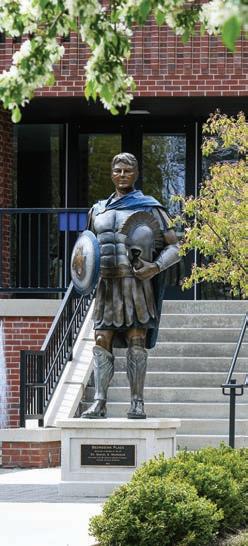
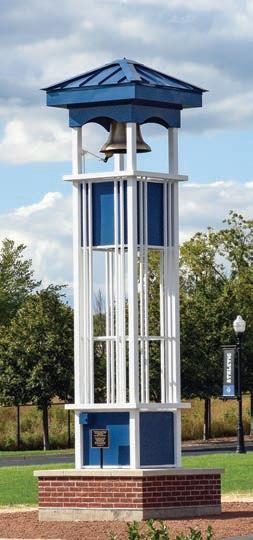
ROOM AND BOARD FOR 202 2 –202 3 $6,180 per semester (average)
There are 24 NCAA Division III teams competing in the Northern Athletics Collegiate Conference, the Northern Collegiate Hockey Association, and the College Conference of Illinois and Wisconsin.

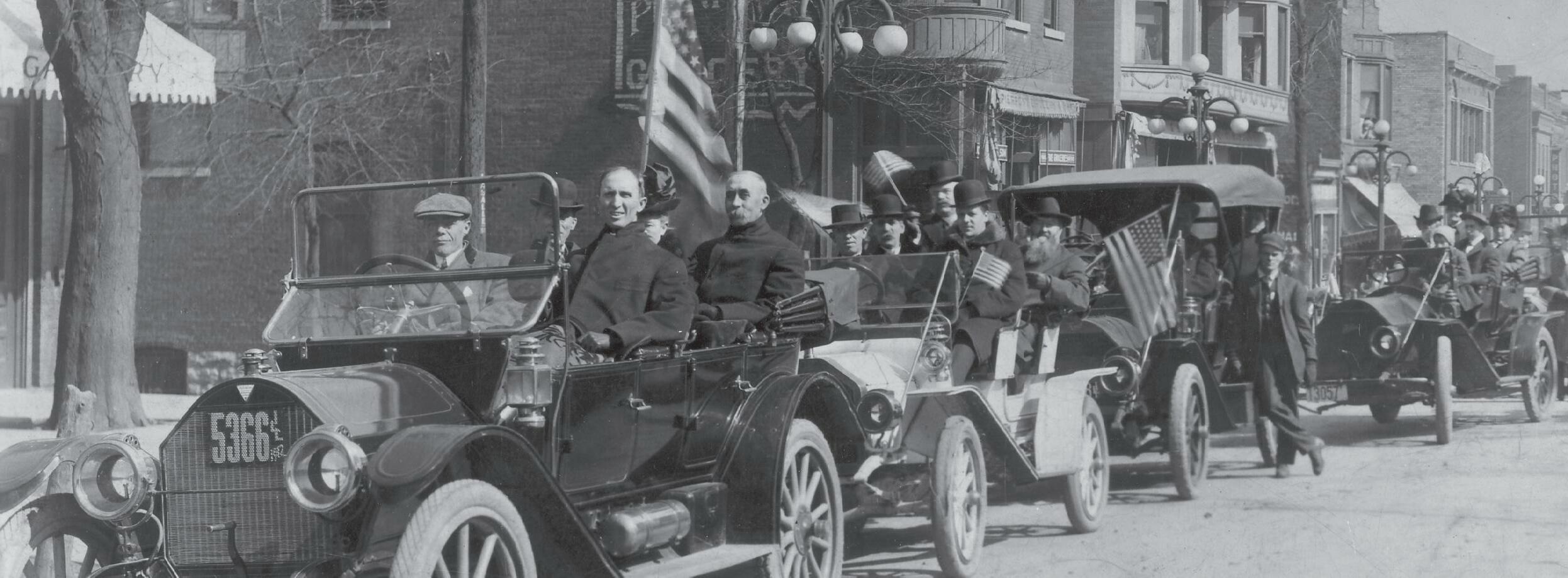
founding of a seminary in the small town of Mendota, Illinois. Though established initially to prepare graduates for ministry, the institution soon adopted a broader mission and moved to a new campus on the western edge of the nearby community of Aurora. With this change came a different name and a growing enrollment. When World War II ended, the campus population swelled again as veterans enrolled in the college’s innovative evening degree program. The 1970s and 1980s saw an expansion of curricular offerings in a number of professional fields and the awarding of advanced degrees in select disciplines. These changes culminated in the 1985 decision to rechristen the institution Aurora University.
The roots of George Williams College run deep in the YMCA movement of the 19th century. In 1884, American YMCA leaders gathered on the shores of Geneva Lake in Williams Bay, Wisconsin, to attend a summer training program. Two years later, the camp was incorporated and the first parcel of the current Williams Bay campus was purchased. Since that time, College Camp has been a source of inspiration, recreation, education, and renewal for thousands of guests and students. In 1992, Aurora University and George Williams College traditions blended when the two institutions entered into an affiliation agreement that paved the way for a merger eight years later.
Today, Aurora University is a private, independent, comprehensive institution with an enrollment of approximately 6,200 students. Aurora University is accredited by the Higher Learning Commission to award degrees at the baccalaureate, master’s, and doctoral levels. On the Aurora campus, AU offers a variety of undergraduate and graduate programs.
Undergraduate students are active in a wide range of on- and off-campus learning experiences. Students participate in more than 50 musical, literary, religious, social, professional, and service organizations and play active roles in campus governance, as well as compete in 24 NCAA Division III athletic teams.
At AU, the educational needs of students are served best through the formation of strategic partnerships. Such collaborations also enhance the well-being of the communities around the campuses. Aurora University draws upon the rich legacies and distinctive traditions of Aurora College and George Williams College. This history has helped shape Aurora University, which will continue to build upon its important past to help influence the future.
1893 After more than a year of planning by the Western Advent Christian Publication Association, Mendota Seminary opened on January 9, 1893. Just six months later, the name was changed to Mendota College. The seminary opened with three students and grew to 31 students at the end of winter term.
1894 Advent Christian women created The Helper’s Union, an organization designed to contribute food, linens, rugs, furniture, and funds for decorating as needed. They were also influential in raising funds for Mendota College’s Bible Training Department.
1899 Mendota C ollege received its own charter after broadening its programs into a traditional liberal arts curriculum.
1900 Mendota C ollege played its first football game against East Side High School in Mendota, Illinois.
1911 Groundbreaking for a new campus in Aurora took place on May 31, 1911. The institution changed its name and formally incorporated as Aurora College in October.
1912
Clas ses at Aurora College began on April 4, 1912. The campus consisted of Eckhart Hall, Wilkinson Hall, and Davis Hall. The Tin Can Jimmie Club was formed to raise funds for the college endowment.
1913
T he men’s basketball team completed its first season with a final record of eight wins and four losses.
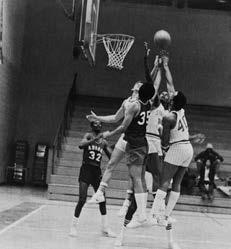
1922
The first constitution of the Students’ Association of Aurora College was written. It established a Finance Committee, an Athletics Committee, and a Committee on Societies.
1929
The fall 1929 football team was the first to be called the Spartans. They played on Patterson Field, which was built by students five years earlier. The team had a season record of four wins and three losses.

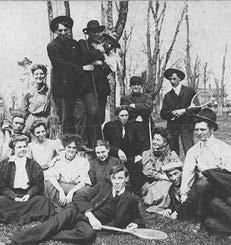
1930
The Illinois Department of Public Instruction authorized Aurora College to train elementary and secondary school teachers, marking the beginning of one of the institution’s most successful and longest-standing academic programs.

1947 In an eff ort to serve veterans returning from World War II, Aurora College introduced an innovative evening program. The flexible schedules allowed former soldiers to earn a college degree while working full-time jobs.
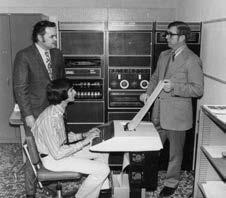
1955 C ampus facilities took a major step forward with the construction of an addition to Davis and Memorial Halls, which was dedicated on December 3, 1955. This was soon followed by the construction and dedication of Jenks Hall in 1957. These new spaces allowed the university to meet the growing demand for on-campus housing.
1959 Snell Field, a new home for baseball, was dedicated in memory of C oach Percy Snell, the first coach hired by Aurora College. Snell had been the sole c oach for all athletics programs for man y years. The field hosted baseball games on the southwest c orner of campus for nearly 50 years.
1962 A cademic offerings were enriched with the opening of the Stephens Hall of Science and the Charles B. Phillips Library.
1967 A new carillon system was purchased, thanks to a generous gift from Kentucky Fried Chicken founder Col. Harland Sanders.
1970 Two new buildings were dedicated: Watkins Hall, a residence hall, and Alumni Hall, which replaced the long-standing Quonset huts that had been used for the college’s athletics programs.
1972 The last bachelor’s degree in theology was awarded, reflecting Aurora College’s independence from any particular religious denomination. Faith and service programs continued to flourish at the college.
1978 T he women’s basketball team completed its first season.
Recognizing the importance of the arts, the college opened Perry Theatre, adjacent to Stephens Hall.
1981 Two new building additions were made: A new dining facility was attached to Alumni Hall, and a new laboratory wing was added to Stephens Hall.
1982 Aurora College joined the NCAA. Since that time, the Spartans have appeared in more than 150 NCAA Division III tournaments.
1985 A fter decades of growth and expansion of academic programs, the institution changed its name from Aurora College to A urora University.
Graduate programs in education and business were offered.
1986 George Williams College, located in Downers Grove, Illinois, closed its doors and transferred its social work and leisure and environmental resources administration programs to Aurora University.
The football program was reinstated after a 32-year hiatus.
1989 Dunham Hall was dedicated, funded at the time by the largest single donation in the history of the university, from Martha (Dunham) Schingoethe.
1990 T he Schingoethe Center for Native American Cultures, which houses more than 4,000 Native American ethnographic artifacts and artworks, opens in Dunham Hall. The center originally organized exhibitions and programs related to Native American history and culture In recent years, the center has shifted its focus featuring a variety of American art forms.
1992 A urora University entered into an affiliation agreement with George Williams College to continue the legacy of its programs and the YMCA College Camp at the Williams Bay, Wisconsin, campus.
1997 T he Williams Bay campus of George Williams College began a period of expansion and renovation, with the acquisition of 91 additional acres of land and a number of enhancements to existing facilities.
2000 Aurora University and George Williams College formally merged.
The university launched the Doctor of Education degree, the first doctoral program in the institution’s history.
2001 Music by the Lake , a successful summer perf orming arts festival from the mid-20th century, was re-established at GWC.
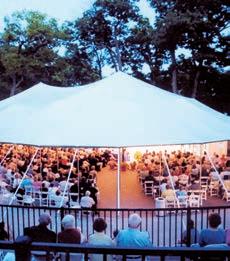
The Wackerlin Center for Faith and Action was established, thanks to a generous bequest from Helena Zentmyer Wackerlin, a 1918 alumna of Aurora College.
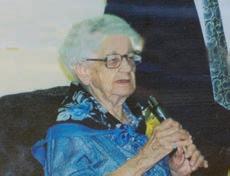
2003 A urora University received a $10 million federal grant to create the Institute for Collaboration.
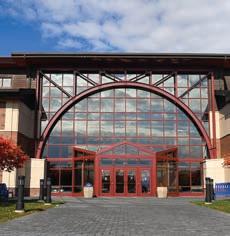
2006 T he university established the Celebrating Arts and Ideas series, a cultural enrichment program for the enjoyment of Fox River Valley community members.
Aurora University became a charter member of the Northern Athletics Collegiate Conference.
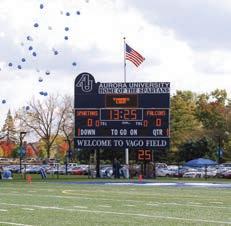
T he Roger and Mar ilyn Parolini Music Center was renovated with the support of a generous gift from alumni R oger and Marilyn Parolini.
2007 In wha t would become a hallmark of the undergraduate experience, the university established the Crouse Center for Student Success (now known as the Crouse Center for Academic Advising), which ensures that students are maximizing their educational opportunities at AU.

2008 At GWC, the new Ferro Pavilion was completed in time for the eigh th season of Music by the Lake . In Aurora, Vago Field was completed.
2009 AU began offering graduate courses at the Woodstock Center in Woodstock, Illinois.
2010 A new addition to Alumni Hall was built, providing new, state-of-the-art facilities for the nursing and social work programs. In Crimi Auditorium, the pipe organ, Opus 119, was installed, heralding the importance of the arts at AU.
2011 Men’ s lacrosse played its first varsity season in the Midwest Lacrosse Conference.
2012 A new residence hall, Centennial Hall, located between the Institute for Collaboration and Watkins Hall, welcomed students for the spring semester.
AU Online begins offering undergraduate and graduate programs.
2013 Women’s lacrosse began its first season as an NCAA team, playing in the Midwest Women’s Lacrosse Conference.
2014 Men’ s hockey made its debut as an NCAA Division III team in the Northern C ollegiate Hockey Association. The team played two previous seasons in the American Collegiate Hockey Association.
T he Aurora University Orchard Center — a facility four miles from the Aurora main campus that includes classrooms, a computer lab, a lounge, and both faculty and administrative offic es — opened to accommodate demand for the university’s undergraduate, graduate, and adult degree completion programs.
2015 The Hill Welcome Center and Schingoethe Center building opened.
2016
T he renovated Lowrey Hall and the new Thomas R. and Shirley Klein Sc ott Library were dedicated on the GWC campus. Lowrey houses a t wo-story library, science labs, and classrooms.
2017
Construction began on Spartan Athletic Park, an 80-acre facility that includes tournament-quality softball, lacrosse, soccer, and football competition spaces with plans for additional sports facilities.
2018 The dining facilities in Alumni Hall were renovated and expanded . The dining hall includes all new kitchen equipment, furniture, flooring , and a new raised patio.
Men’s volleyball and women’s hockey made their debut.
The Ingalls Building, an icon of the GWC campus since 1925, was transformed into the C hapel.
2019
The first class of MBA and MPA Plus One students graduated, earning their master’s degree in one year following their undergraduate experience.
S tudents, alumni, faculty, and staff concluded a yearlong celebration in honor of Aurora University’s 125th birthday.
2020 On-campus parking was vastly improved with the addition of a 500-space, four-story parking garage.
Students enjoyed new acoustically controlled band and vocal performance spaces in the expanded Roger and Mar ilyn Parolini Music Center.
2021
The Kimberly and James Hill Center for Student Success opened, a place where students receive counsel, guidance, and inspiration to discover their path in work and life.
The natural landscape of the GWC lakefront was restored.
AU men’s and women’s wrestling programs began competition, becoming the 23rd and 24th collegiate sports.
Pathways Autism Initiative launched, helping students with autism reach their potential in their studies and in their careers.
floor houses
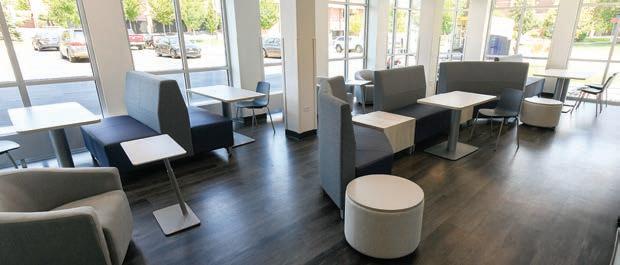

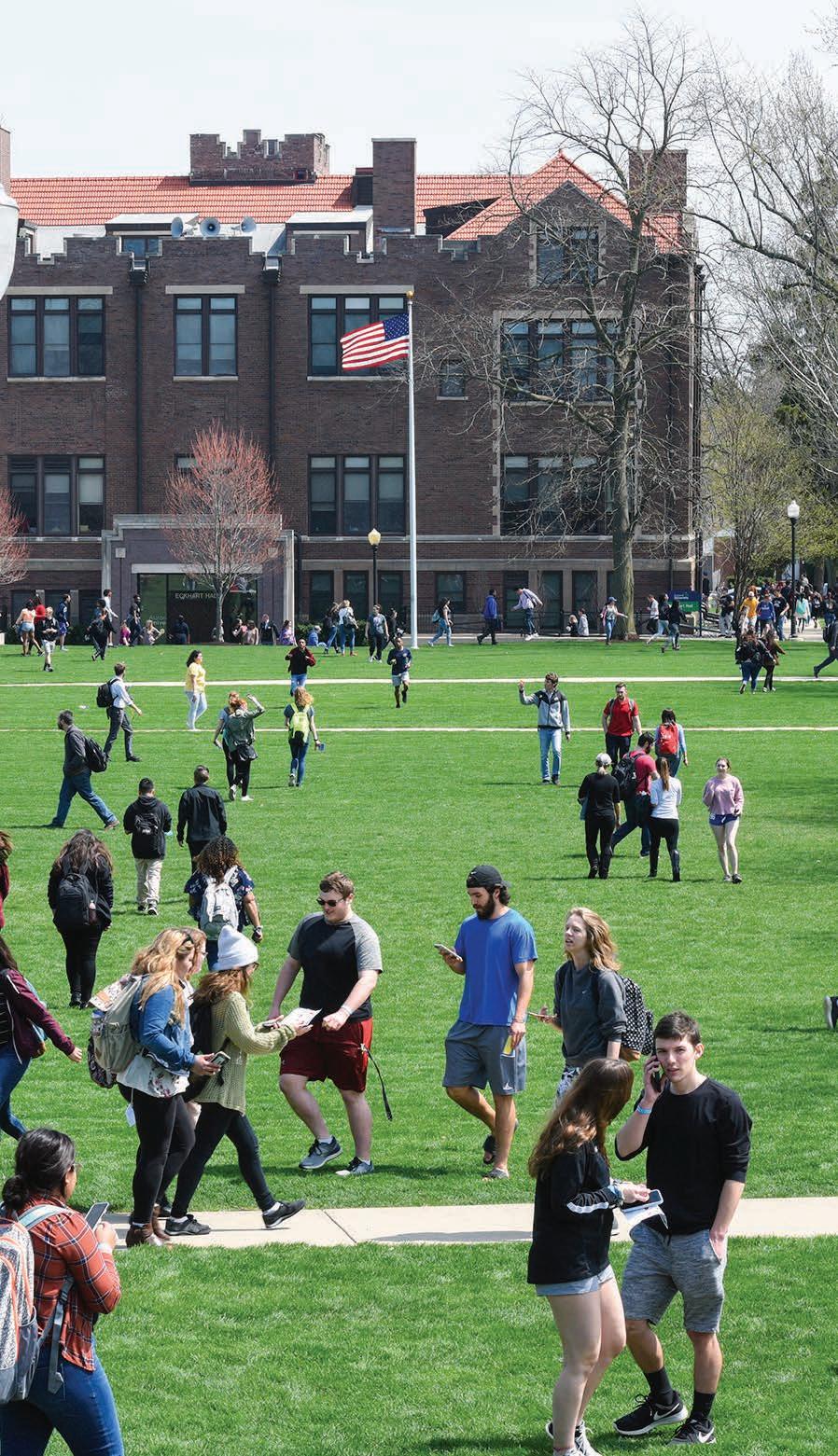
INSTITUTIONAL ENROLLMENT 202 1
matriculated students
students
Graduate students
2021 FRESHMAN CLASS
applicants
Freshmen admitted
Admit rate
First-time, degree-seeking freshmen entering
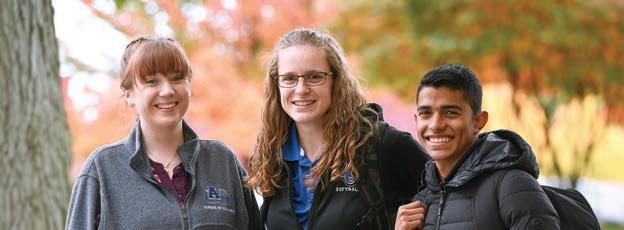
TOTAL UNDERGRADUATE STUDENT BODY PROFILE (202 1) Gender
Women
Men
Ethnicity
White, non-Hispanic
Hispanic/La tino
Black or A frican-American
Other Demographics
Out -of-state residents
Live off campus or commute
Live on campus
DEGREES AWARDED BY AU, JULY 1, 20 20 –JUNE 30, 202 1
Bachelor’s degrees
Master’s degrees
Doctoral degrees
THE AURORA UNIVERSITY UNDERGRADUATE EXPERIENCE IS centered around the university’s core values of integrity, citizenship, continuous learning, and excellence. Through the university’s interdisciplinary general education offerings and elective choices, students experience a range of perspectives and disciplines to become well-rounded individuals. These experiences complement the in-depth work students do within their majors and minors and
Accounting (BS)
Actuarial Science (BS)
Autism Studies (BA) Biology (BS)
Biology/Secondary Education (BS)
Business Administration (BA) Chemistry (BS)
Chemistry/Secondary Education (BS) Communication (BA)
Computer Science (BS)
Criminal Justice (BA)
Cybersecurity (BS)
Early Childhood
Special Education with ESL/Bilingual (BA)
Elementary Education (BA) English (BA)
English/Secondary Education (BA)
Environmental Studies and Sustainability (BS)
Exercise Science (BS)/ Athletic Training (MS) Finance (BS)
Graphic Design (BA) Health Science (BS) Healthcare Administration (BS) History (BA)
History/Secondary Education (BA) Human-Animal Studies (BS) Marketing (BS) Mathematics (BS)
Mathematics/Secondary Education (BS) Music (BA)
Musical Theatre (BA) Nursing (BSN)
Parks and Recreation Leadership (BS)
Physical Education K–12 Teaching Licensure (BA)
Political Science and Public Policy (BA)
Psychology (BA)
Social Work (BSW)
Sociology (BA)
Spanish (BA)
Special Education with ESL/Bilingual (BA)
Sport Management (BA) Theatre (BA)
Therapeutic Recreation (BS)
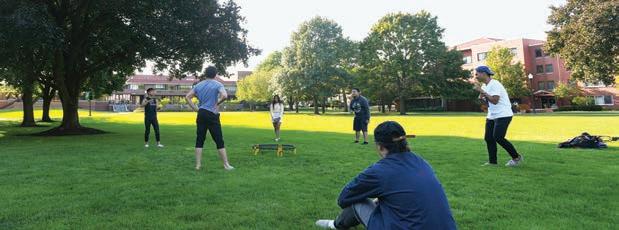
Pre-Chiropractic
Pre-Dentistry
Pre-Law
Pre-Medicine
Pre-Occupational Therapy
Pre-Optometry
Pre-Pharmacy
Pre-Physical Therapy
Pre-Physician Assistant
Pre-Podiatry
Pre-Veterinary Medicine
enhance their on-campus extracurricular activities. Taken together, the undergraduate curriculum prepares responsible citizens who discover and reflect, communicate effectively, and think critically.
AU students benefit from a student-faculty ratio of 20:1, which ensures that students get to know their professors — and that the faculty get to know them and their learning styles. AU faculty members are award-winning scholars who are dedicated to helping students succeed.
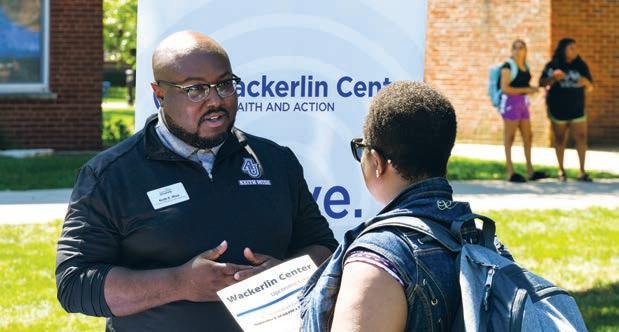
Aurora University offers support services and extracurricular experiences designed to help students get the most out of college and to engage them in examining new perspectives.
Aurora University’s First Year Experience (FYE) program is designed to facilitate a first year student’s transition into college. It is the point where new AU students will begin the process of discovering what matters. The program is focused on guiding students to identify their strengths, interests, and values; orienting students to college life at AU; engaging students in campus activities; and assisting students in the development of essential academic, college, and life skills. The program is comprised of guided workshops, journaling activities, self-assessments, and participation in various campus events.
The Crouse Center for Academic Advising offers advising and mentoring services to support students as they plan, build, and complete bachelor’s and master’s degrees that reflect their distinctive strengths and aspirations. Throughout their time at AU, students work with academic advisors to explore and choose majors, select courses to fulfill their academic goals, and develop and follow graduation plans.

The Kimberly and James Hill Center for Student Success prepares students for meaningful and successful careers and lives through vocational exploration and career development. Career Services advisors support students as they explore and develop their distinctive strengths and aspirations, and then guide them as they transition to the workplace, graduate or professional school, or to service. Programs offered at the center include resume and job search workshops, individual appointments, and career conversations with alumni and employers. The Hill Center also houses Spartan Attic, which provides free gently used and new professional clothing to students.
The Charles B. Phillips Library houses a collection of more than 10,000 print books specifically curated to support the curriculum. Electronic resources include 270,000 ebooks and an online catalog networked with 130 academic and research libraries in the state. More than 80 indexes and online databases provide current
students, faculty, and staff with access to more than 400,000 journal titles and 70,000 streaming media titles. Professional librarians are available during all open hours for research assistance through online chat, phone, or text. Librarians are also available by appointment for more in-depth research at the library or via Zoom. The library offers space for collaborative or silent study, including reservable study rooms and rolling white boards. Phillips Library is open seven days a week when classes are in session and offers a variety of services to the campus community, including a computer lab with printers and laptops available for checkout, puzzles, and games for relaxation, as well as special events throughout the year.
The Academic Support Center fosters academic growth through engagement in the learning process. The goal of the center is to enable students to build on their own abilities and skills to maximize their academic potential. The center provides free services, available to all university students from undergraduates to doctoral candidates. Mathematics, science, and coursebased peer tutoring are available for undergraduate students. Comprehensive professional writing support is available for students at all levels.
Aurora University is committed to compliance with all applicable federal laws regarding reasonable accommodation to address environmental barriers. The goal of the Disability Resource Office

is to create learning environments that are accessible, equitable, and inclusive in order to empower students to participate in every aspect of campus life.
Counseling through the Wellness Center is a free and confidential resource for all currently enrolled AU students. Emotional, social, or psychological concerns can interfere with daily functioning at any point in life, and often occur during the many changes that are a part of college. Individual services are designed to be short-term. Often a few individual meetings can help students better identify, understand, and resolve the barriers that may be interfering with their sense of personal well-being and/or academic success.
The mission of Health Services is to maximize student, faculty, and staff well-being, in addition to encouraging the establishment of lifestyle behaviors that promote healthful living. Health Services is comprised of the following components:
» Clinical Services
» Management of COVID-19
» SpartanHealth Portal
In addition to campus resources at both Health Services and Counseling Services, students have 24/7 access to medical and mental telehealth support at no cost. There are four services available 24/7 to students:
» Medical: On-demand access to a medical provider who can treat a wide range of common illnesses like cold and flu, sinus infection, and allergies.
» TalkNow: On-demand access to a mental health professional to talk about anything at any time.
» Scheduled Counseling: Scheduled options to speak to a licensed counselor (12 times per academic year, per student).
» Health Coaching: Unlimited virtual visits can be scheduled with a nutrition specialist to empower students to live healthier and help prevent chronic diseases.
Aurora University’s Pathways program for college students with autism is a multi-faceted program designed to help students with autism reach their potential in their studies and in their careers. The Pathways program is designed to provide the services students on the autism spectrum need in order to prepare for, attend, and succeed in college. The Pathways Journey is comprised of three options, including Pathways Summer Camps for high school students, Pathways College Connections for high school and transfer students, and the Pathways Collegiate Program.
Aurora University operates a 24/7 campus police department with sworn officers. It is dedicated to ensuring the safety and security of the entire university. Additionally, AU maintains an active Emergency Management Office responsible for coordinating all activities necessary to prepare for and respond to life-safety emergencies. The university has a mass emergency notification system that communicates urgent messages across text, email, Facebook, and Twitter platforms. Students are automatically enrolled; however, family members are also encouraged to sign up at aurora.edu/alerts. Other safety-related services at AU include code blue emergency call boxes, patrols, safety escorts, and campuswide training, including fire, severe weather/tornado, and active shooter drills.
Aurora University offers a wide array of student organizations, leadership opportunities, cultural excursions, concerts, lectures and performances, and intramural athletics. Student life organizations and activities create a campus culture where students feel included, involved, and connected and where they have opportunities to explore new interests and follow their passions. Students also have opportunities to participate in choirs and ensembles, theatre productions, and art exhibitions. Additionally, AU fields 24 NCAA Division III athletic teams.
Travel in May and Summer programs offer students opportunities to participate in for-credit, faculty-led travel/study trips to destinations in the United States and abroad. Recent domestic and international destinations for faculty-led travel courses have included Colorado, Austria, Costa Rica, England, France, Greece, Italy, and Puerto Rico. In addition to offering students the opportunity to learn firsthand about various cultures and ways of living, many trips also include a service component. Completing coursework in May or summer allows AU students to focus on one particular aspect of the curriculum for the term.
The Schingoethe Center is a state-of-the-art museum that exposes students to art, culture, and significant issues impacting the world. The center curates thought-provoking exhibitions on art and Native American cultures by collaborating with artists, working with other museums, and using its unique collection of 4,000 American and Native American artworks and ethnographic items. The Schingoethe Center also provides tours, workshops, lectures, and other unique learning opportunities for students, often inviting artists, scholars, authors, and cultural experts from across the country to lead such programs.
The mission of the Wackerlin Center is to offer students and employees spaces and experiences that promote belonging and flourishing, solidarity and service, and reflection and purpose. The center is a space, resource, and advocate that advances diversity, equity, and inclusion. Through programming, events, trainings, and mentoring, the center works to ensure that each individual at AU feels an authentic sense of connection and empowerment. As local and global citizens, students receive encouragement to engage the world through acts of service and solidarity. Through community projects and hands-on learning, the center prepares students to be community leaders who stand with the socially vulnerable. The Wackerlin Center complements the efforts of other AU departments to better support a student’s vocational journey and meet their holistic needs.
The center’s building is a unique design located in a natural setting. The retreat-like space provides members of the AU community an ideal area to contemplate and discuss issues of faith, responsibility, and leadership. The Labyrinth, located outside of the building, serves as both a symbol of life’s journey and a tool for members of the AU community to use for purposes of meditation, reflection, and vocational exploration. Libby’s Place, the on-campus food pantry for students, is housed inside the center.
Aurora University prizes diversity and inclusion with a long history of providing education access to students traditionally underrepresented in higher education. In fact, we are recognized by the United States government as a Minority-Serving Institution (MSI). This means we celebrate diversity and serve as a national model for private universities. To better serve our underrepresented students, the Office of Black Student Initiatives and Office of Latino/a Student Initiatives were created to provide a welcoming space for students, advocate for equality, serve as sources of culturally inspired programming, and act as liaisons with other campus resources. Both offices are housed within the Wackerlin Center, and each has a central role in carrying out the center’s mission.
The Office of Black Student Initiatives supports the experiences of Black students by facilitating a sense of belonging and promoting their academic success. The office achieves these goals by providing mentorship to Black students, programming that promotes cultural awareness, and trainings that develop campus cultural competency. Currently, the office supports the Black Student Union (BSU) and co-sponsors Spartan Summit and Cultural Exchange.
The Office of Latino/a Student Initiatives provides all students with educational, social, and leadership opportunities that promote self-awareness and celebrate the Latino/a experience. Some of the resources and services offered include: guidance in the development of success plans, referrals, and connections to wide-ranging campus support services, including AU’s Latino/a-serving student organizations, which promote leadership opportunities, networking skills, academic success, and community service.
AURORA UNIVERSITY OFFERS UNDERGRADUATE TRANSFER, master’s, and doctoral programs through the Center for Graduate Studies, Woodstock Center, and AU Online.
Undergraduate transfer programs are designed for students who have several years of life experience and some previous college coursework. Transfer credit from other regionally accredited institutions is accepted.
Aurora University also offers master’s degrees in several areas and a doctoral degrees in education. Programs are offered full- and part-time, on campus, online, and through remote instruction.
Director of Special Education Endorsement
ESL/Bilingual Endorsement
Special Education Endorsement (LBS 1)
Master of Arts in Curriculum and Instruction: Teaching Diverse Learners with English as a Second Language (ESL) and Learning Behavior Specialist 1 (LBS 1) Endorsements

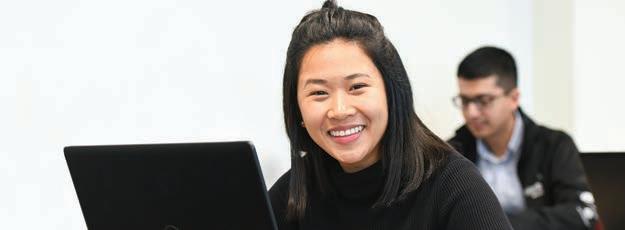
Master of Arts in Educational Leadership with Principal Endorsement Master of Arts in Educational Technology » Technology Specialist Endorsement
Master of Arts in Reading Instruction » Reading Teacher Endorsement
Master of Science in Athletic Training
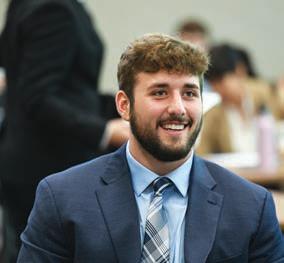
Master of Science in Nursing (Entry to Practice)
School of Social Work
Co-Occurring Substance Use and Mental Health Disorder Professional (CODP I) Graduate Addictions Certification (CADC)
Post-MSW Illinois Professional Educator License with School Social Work Endorsement
Master of Social Work
Tracks: Addictions, Child Welfare, Forensic Social Work, Gerontology, Health Care, Leadership Administration, and School Social Work
Master of Arts in Teaching Content Areas: Biology, Chemistry, Earth and Space Science, Economics, English, Environmental Science, Geography, History, Mathematics, Physics, Political Science, Psychology, Sociology and Anthropology, and Spanish
Master of Business Administration
Tracks: Business Management, Digital Marketing, Healthcare, and Sport Management
Master of Science in Criminal Justice Concentrations: Leadership and Administration and Psychology and the Law
Dunham School of Business
Master of Business Administration
Master of Science in Digital Marketing and Design
Superintendent Endorsement
Master of Arts in Educational Leadership with Principal Endorsement Doctor of Education
» Advanced Standing: Leadership in Educational Administration
» Instructional Leadership: Coaching and Mentoring
» Leadership in Educational Administration
School of Health Sciences
Master of Science in Exercise Science
School of Social and Behavioral Sciences
Master of Public Administration
Master of Social Work
Tracks: Addictions, Child Welfare, Forensic Social Work, Gerontology, Health Care, Leadership Administration, Military and Veteran Social Work, and School Social Work
Post-MSW Illinois Professional Educator License with School Social Work Endorsement
Dual Master of Social Work/Master of Business Administration
Dual Master of Social Work/Master of Public Administration
AURORA UNIVERSITY WOODSTOCK CENTER PROGRAMS
Elementary Education (BA) Social Work (BSW)
Graduate Programs
Co-occurring Substance Use and Mental Health Disorder Professional (CODP I)
Director of Special Education Endorsement
Special Education Endorsement (LBS 1)
ESL/Bilingual Endorsement
Graduate Addictions Certification (CADC)
Master of Arts in Curriculum and Instruction: Teaching Diverse Learners
Master of Arts in Educational Leadership with Principal Endorsement
Master of Arts in Educational Technology
» Technology Specialist Endorsement
Master of Arts in Reading Instruction
» Reading Teacher Endorsement
Master of Social Work
Tracks: Addictions and Child Welfare
Post-Baccalaureate Program
Teacher Residency
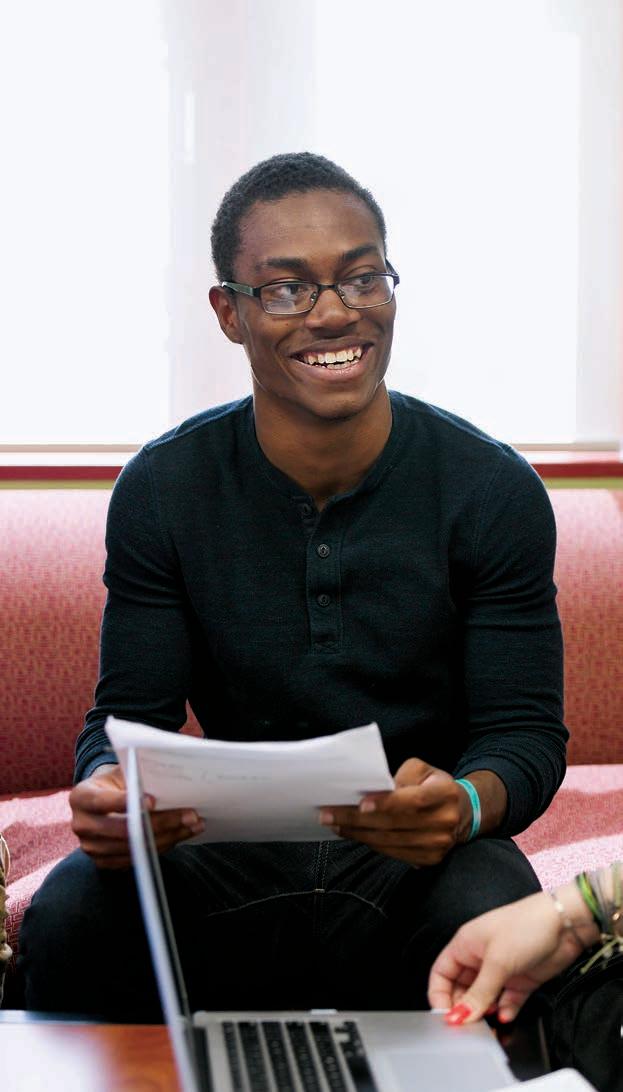
2022–2023 TUITION
Full time (12–17 semester hours): $13,600 per semester
Part time (1–11 semester hours): $438 per semester hour
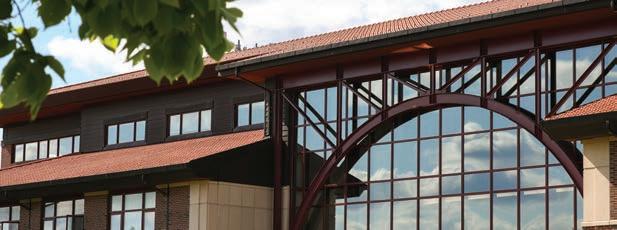
Average room and board (based on double occupancy with air-conditioning and weekly 15-meal plan): $12,360 per year
Graduate tuition ranges from $492 to $715 per semester hour, depending on the program. For more information about tuition and fees, visit aurora.edu/tuition.
Undergraduate Programs: $438
Graduate Programs: $580
Master of Social Work: $618
Doctor of Education: $670
More than 98% of incoming AU undergraduate students receive some form of financial aid, including scholarships and grants. Need-based financial aid is based on the Free Application for Federal Student Aid (FAFSA). AU awarded more than $36.9 million in overall institutional scholarships and grants in 2020–2021.
AURORA UNIVERSITY FIELDS 24 NCAA DIVISION III intercollegiate athletic teams, which play in the Northern Athletics Collegiate Conference, the Northern Collegiate Hockey Association, and the College Conference of Illinois and Wisconsin. The Spartans boast a winning tradition with 77 conference championships in recent years and 96 appearances in NCAA tournaments. AU student-athletes excel on the field, in the classroom, and in the community.
AURORA UNIVERSITY HISTORY OF CHAMPIONS Conference Championships


Women since 1982 (181)
Appearances Men Women since 1982 (167)
CONFERENCE CHAMPIONSHIPS (25)
2022 | 2021 | 2012 | 2006 | 2005 | 2002
2001 | 2000 | 1999 | 1998 | 1997 | 1995
1994 | 1993 | 1992 | 1991 | 1990 | 1989
1988 | 1987 | 1986 | 1985 | 1984 | 1978 | 1974
NCAA APPEARANCES (24)
2022 | 2021 | 2019 | 2018 | 2012 | 2011 | 2010
2006 | 2005 | 2004 | 2002 | 2000 | 1999
1998 | 1997 | 1996 | 1995 | 1994 | 1993
1992 | 1991 | 1990 | 1989 | 1987
CONFERENCE CHAMPIONSHIPS (22)

2017–18 | 2014–15 | 2012–13 | 2009–10
2008–09 | 2007–08 | 2006–07 | 2004–05
2003–04 | 1997–98 | 1996–97 | 1993–94
1988–89 | 1987–88 | 1985–86 | 1984–85
1983–84 | 1982–83 | 1979–80 | 1972–73
1971–72 | 1970–71
NCAA APPEARANCES (11)
2018-19 | 2017–18 | 2012–13 | 2009–10
2008–09 | 2007–08 | 2006–07 | 2004–05
2002–03 | 2000–01 | 1997–98
CONFERENCE CHAMPIONSHIPS (8)
2002–03 | 2001–02 | 2000–01 | 1995–96
1994–95 | 1993–94 | 1992–93 | 1988–89
NCAA APPEARANCES (4)
2003–04 | 2001–02 | 1994–95 | 1993–94
CONFERENCE CHAMPIONSHIP (1)
2022
CONFERENCE CHAMPIONSHIPS (8)
2020 | 2017 | 2016 | 2015 | 2013 | 2012 | 2006
1973
CONFERENCE CHAMPIONSHIPS (7)
2016 | 2014 | 2013 | 2012 | 2008
2006 | 2005
INDIVIDUAL NCAA APPEARANCES (5)
2022 | 2016 | 2015 | 2014 | 2013
CONFERENCE CHAMPIONSHIPS (9)
2021 | 2020 | 2019 | 2016 | 2008 | 2004
2000 | 1999 | 1998
NCAA APPEARANCES (6)
2021 | 2019 | 2008 | 2004 | 2000 | 1992
Men’s Golf
CONFERENCE CHAMPIONSHIPS (11)
2022 | 2021 | 2020 | 2019 | 2018 | 2009
2006 | 1992 | 1990 | 1984 | 1974
NCAA APPEARANCES (5)
2022 | 2021 | 2019 | 2018 | 2010
CONFERENCE CHAMPIONSHIPS (9)
2021 | 2019 | 2018 | 2016 | 2015 | 2014 |
2008 | 2007 | 2006
NCAA APPEARANCES (6)
2021-22 | 2019–20 | 2018–19 | 2016–17
2015–16 | 2014–15
Men’s Indoor Track and Field
CONFERENCE CHAMPIONSHIPS (4)
2015 | 2014 | 2013 | 2007
INDIVIDUAL NCAA APPEARANCES (14)
2022 | 2019 | 2018 | 2017 (3) | 2016 | 2015
2012 | 2010 (2) | 2009 (3)
Women’s Indoor Track and Field
CONFERENCE CHAMPIONSHIPS (9)
2020 | 2019 | 2018 | 2017 | 2016 | 2015
2014 | 2013 | 2011
INDIVIDUAL NCAA APPEARANCES (9)
2020 | 2019 | 2018 | 2017 (3) | 2016 (2)
2015
Men’s Lacrosse
CONFERENCE CHAMPIONSHIPS (7)
2022 | 2018 | 2017 | 2016 | 2015 | 2014 | 2013
NCAA APPEARANCES (6)
2018 | 2017 | 2016 | 2015 | 2014 | 2013
Women’s Lacrosse
CONFERENCE CHAMPIONSHIP (2)
2022 | 2021
NCAA APPEARANCES (2)
2022 | 2021
Men’s Outdoor Track and Field
CONFERENCE CHAMPIONSHIPS (5)
2019 | 2018 | 2015 | 2014 | 2006
INDIVIDUAL NCAA APPEARANCES (21)
2022 | 2019 | 2018 (2) | 2017 (4) | 2016 (5)
2015 (3) | 2010 | 2009 (2) | 2008 | 2007
Women’s Outdoor Track and Field
CONFERENCE CHAMPIONSHIPS (9)
2019 | 2018 | 2017 | 2016 | 2015 | 2014
20 13 | 2012 | 2006
INDIVIDUAL NCAA APPEARANCES (19)
2021 | 2019 | 2018 (2) | 2017 (5) | 2016 (3)
2015 (6) | 2014
Men’s Soccer
CONFERENCE CHAMPIONSHIPS (13)
2019 | 2004 | 1997 | 1990 | 1985 | 1979
1978 | 1977 | 1976 | 1975 | 1973 | 1971 | 1970
NCAA APPEARANCE (1)
2006
Women’s Soccer
CONFERENCE CHAMPIONSHIPS (16)
2014 | 2013 | 2012 | 2011 | 2010 | 2009
2008 | 2007 | 2006 | 2005 | 2003 | 2002
2000 | 1999 | 1997 | 1996
NCAA APPEARANCES (11)
2014 | 2013 | 2012 | 2011 | 2010 | 2009
2007 | 2006 | 2005 | 2002 | 2001
Softball
CONFERENCE CHAMPIONSHIPS (24)
2021 | 2016 | 2015 | 2014 | 2013 | 2009
2008 | 2007 | 2006 | 2005 | 2004 | 1997
1993 | 1991 | 1990 | 1989 | 1986 | 1985 | 1983
1982 | 1981 | 1980 | 1979 | 1978
NCAA APPEARANCES (17)
2016 | 2015 | 2013 | 2010 | 2008 | 2006
2005 | 1995 | 1994 | 1993 | 1992 | 1991
1990 | 1988 | 1986 | 1985 | 1982
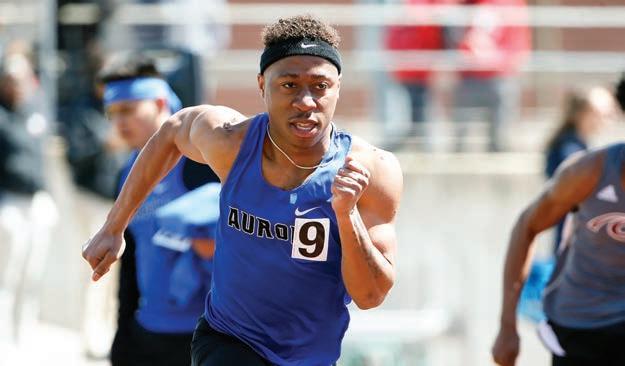

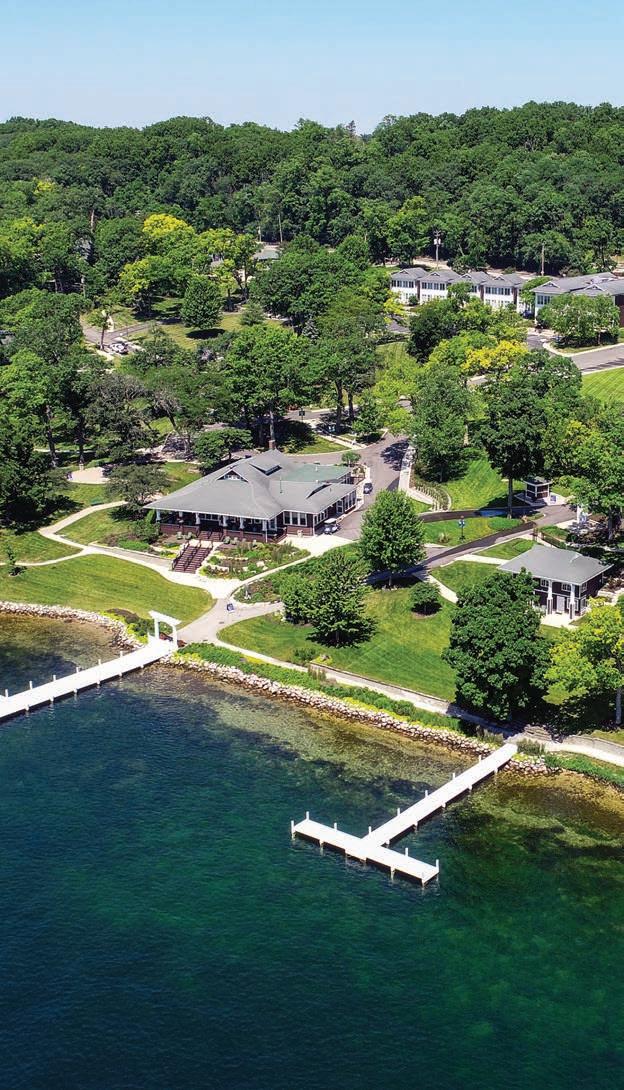
of Geneva Lake in Williams Bay, Wisconsin, the George Williams College campus offers traditional undergraduate degrees.

Business Management (BA)
Environmental Science and
Sustainability (BS)
Nursing (BSN)
Psychology (BA)
Social Work (BSW)
Undecided
The roots of George Williams College run deep in the YMCA movement of the 19th century. In 1884, American YMCA leaders gathered on the shores of Geneva Lake in Williams Bay to attend a summer training program. Two years later, the camp was incorporated, and the first parcel of the current Williams Bay campus was purchased. Since that time, College Camp has been a source of inspiration, recreation, education, and renewal for thousands of guests and students. In 1992, Aurora University and George Williams College traditions blended when the two institutions entered into an affiliation agreement that paved the way for a merger eight years later. Today, George Williams College operates as a campus of Aurora University and is accredited by the Higher Learning Commission through AU. The college serves undergraduate students who are invited to participate in student life activities and also have the option of living on campus.
George Williams College is also home to Music by the Lake, a summer music festival that has, in recent years, included performers such as The Beach Boys, Lyle Lovett, Straight No Chaser, Three Dog Night, Bruce Hornsby, Nathan Gunn, and the Chicago Philharmonic. Summer concerts are staged in the Ferro Pavilion and feature a wide range of styles, such as big band, family, contemporary, classical, and classic rock entertainment.
OPENED IN 2014, THE AURORA UNIVERSITY ORCHARD CENTER, located four miles from the main Aurora campus, offers additional classroom, office, and study space for students enrolled in AU programs. The center offers both day and evening classes and is conveniently located off I-88.

THE AURORA UNIVERSITY WOODSTOCK CENTER, LOCATED IN downtown Woodstock, Illinois, serves northern Illinois with evening and weekend courses. The center offers undergraduate transfer, graduate, and endorsement programs centered around the lives of busy adults.

THROUGH AURORA UNIVERSITY ONLINE PROGRAMS, STUDENTS can earn an AU degree or endorsement from experienced faculty members in a convenient and flexible format. AU Online offers courses year-round in eight-week modules or 16-week semesters. Throughout each program, students are encouraged to share their knowledge, experiences, opinions, and ideas with classmates and faculty members through an interactive online classroom.
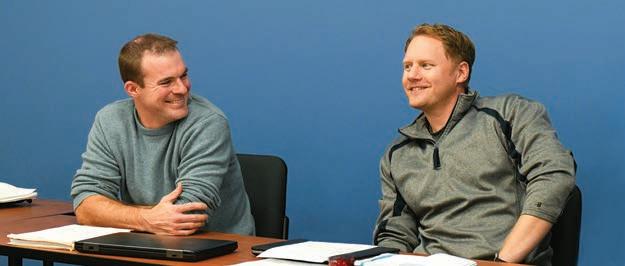
AURORA UNIVERSITY IS COMMITTED TO FISCAL RESPONSIBILITY and to ensuring that its financial resources are invested wisely in its mission and its students.

Revenue
Net student tuition and fees: $79,944,823
Government grants and contracts: $10,461,178
Gifts and private grants: $1,659,104
Endowment and investment income: $1,875,087
Auxiliary enterprises, net: $4,507,032
Other: $921,156
Expenses Instruction: $31,096,961
Public service and research: $1,643,388
Academic support: $13,095,076
Auxiliary enterprises: $8,622,686
Institutional support: $18,404,334 Student support: $15,835,952
2021 Assets Cash and short-term investments: $28,206,615
Net receivables: $1,774,269
Long-term investments, at market: $53,070,271
Prepaid expenses and deferred charges: $1,723,746
Property, plant, and equipment: $157,136,042
Total assets: $241,910,943
LOCATIONS
Aurora University General Inquiries
6 30-892-6431
George Williams College
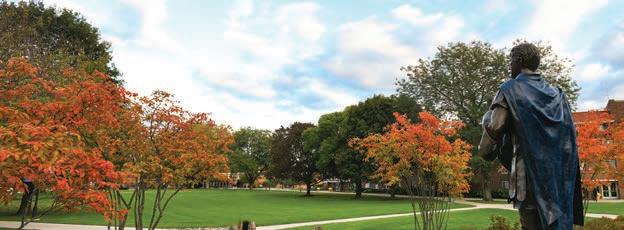
2 62-245-5531
G WCadmission@aurora.edu
Orchard Center
6 30-947-8955
AUadmission@aurora.edu
Woodstock Center
815-337-6051 WCadmission@aurora.edu
AU Online
888-688-1147 onlinein fo@aurora.edu
Academic Support Center
630-844-5520 asc@aurora.edu
Admission
6 30-844-5533 admis sion@aurora.edu
Alumni Relations 630-844-5482 alumni@ aurora.edu Athletics 630-844-5110 a thletics@aurora.edu
Bookstore 630-844-5524 books tore@aurora.edu
Campus Public Safety 630-844-6140 (nonemergency) cpsaf ety@aurora.edu
Career Services 630-844-5403 career@aurora.edu
Charles B. Phillips Library 630-844-5437 phillipslibrary@aurora.edu
Counseling and
Psychological Services
630-844-4932 cservices@aurora.edu
Crouse Center for Academic Advising 630-844-6870 crousecenter@aurora.edu
Development 866-448-3428 development@aurora.edu
Disability Resources Office 630-844-5627 disabilityresources@aurora.edu
Financial Aid 630-844-6190 finaid@ aurora.edu
Graduate Studies
6 30-947-8955
AUadmission@aurora.edu
Health Services 630-844-5434 shs@aurora.edu
Human Resources 630-844-5493 hr @aurora.edu
Information Technology Services
630-844-5790 itshelp@ aurora.edu
Registrar’s Office
6 30-844-5462 registrar@aurora.edu
Residence Life
6 30-844-7881 reslife@aurora.edu
Schingoethe Center 630-844-7843 museum@ aurora.edu
Student Accounts
6 30-844-5470
s tudent.accts@aurora.edu
Student Activities
6 30-844-6510
s tudentactivities@aurora.edu
Student Life
6 30-844-5446 studentlife@aurora.edu